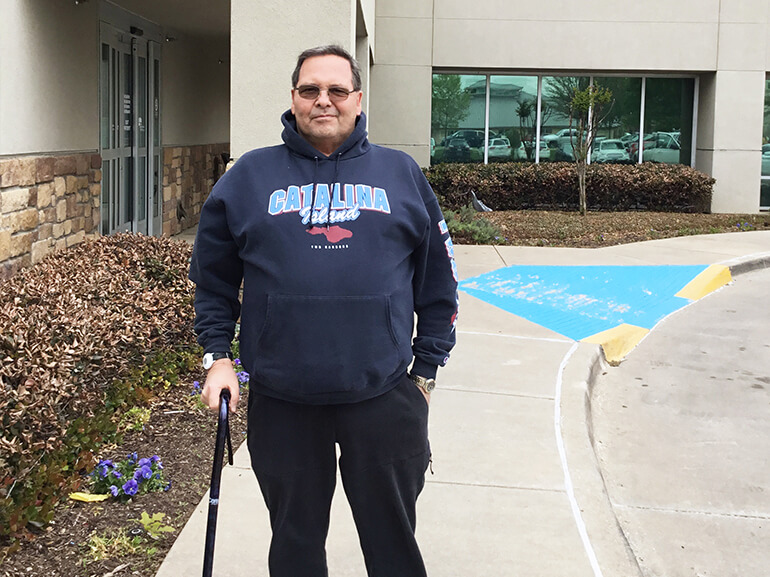Mark's Story

Mark Taylor, 64, was born and raised in Chicago and lived an active business and personal life. For 25 years, he worked for a telecommunication company building wireless communication systems. Then, he shifted careers to take on a new role at University of North Texas where his responsibilities required him to physically navigate around campus to ensure students and various departments had the necessary resources for their roles.
In January, he started feeling ill and had to call off work. His primary care physician prescribed medications to alleviate his flu-like symptoms. Unfortunately, Mark continued to decline so he went to an urgent care clinic where he tested positive for COVID-19 and was admitted to the local hospital.
Mark recalls being in an isolation room for weeks while receiving constant monitoring and respiratory treatment for the virus. Five weeks later, he discharged home before experiencing an exacerbation of symptoms and being readmitted to the acute hospital for several more days.
Mark experienced a variety of challenges following his COVID-19 diagnosis. Due to his compromised respiratory system and deconditioned physical status, basic daily living activities such as transferring out of bed, walking across the room, toileting, showering, dressing and even breathing were very difficult for him to do on his own. Initially, he required two liters of oxygen to assist with breathing when performing these tasks.
He also noticed COVID-19 had affected not only his ability to perform physical tasks but also his ability to concentrate, recall information clearly and plan and implement multi-step activities. Being aware of his need for continued medical monitoring and rehabilitation in order to return to his prior level of functioning, Mark looked into his rehabilitation options and chose Select Rehabilitation Hospital of Denton.
Mark’s main goals upon admission were to improve his respiratory ability, reach his prior level of function and physical activity, perform self-care tasks independently and improve his cognition.
Physical therapy focused on exercises and strategies to improve his physical and respiratory endurance and strength in order to be able to walk independently and reduce fall risk upon his return home. Therapists accomplished this through progressive gait training where Mark progressed from initially being dependent at bedside to walking across uneven surfaces with a rolling walker.
Mark’s occupational therapists worked alongside him to perform basic daily tasks with increased endurance and independence. Using activity tolerance training, therapists helped him decrease his need for moderate assistance and reduce the number of rest breaks secondary to reduced respiratory endurance. Over time, Mark became independent for all daily activities, including simulated cooking and laundry tasks, by using adaptive equipment, intermittent rest breaks and independently monitoring oxygen levels with use of an oximeter.
Mark's speech therapists focused on improving his ability to recall day-to-day information, as well as enhance concentration, thought organization and planning. Treatment sessions included activities to help improve Mark’s memory and complex cognitive tasks such as managing medications, paying bills and meal planning/cooking. Strategies included minimizing external distractions to enhance concentration; performing mind exercises and concentration puzzles to enhance memory and complex attention; utilization of visual/external aids to assist with recall information; and navigating iPhone apps to assist with online purchases (e.g., groceries) until Mark would be able to return to driving.
Mark shared how valuable the support of family and friends were during his recovery as they called daily to check on him and show their care and support. His family also participated in training sessions prior to discharge to promote a smooth and safe discharge home.
After 12 days, Mark discharged home able to walk more than 400 feet using a rollator. He could also walk up and down 12 steps without dependence on oxygen. Additionally, he met all his speech therapy goals and was also able to complete daily living activities with independence, using adaptive equipment as needed.
Several weeks after discharge, Mark completed home health services and was cleared to drive to nearby and familiar locations. Because of his positive inpatient experience at Select Rehabilitation Hospital, Mark decided to begin outpatient services for further conditioning, endurance training and strengthening with a goal of fully returning to his prior level of function and return to work.
Mark recounts his experience saying, “The hospital staff and my personal faith in God gave me strength to recover and return to my life.”